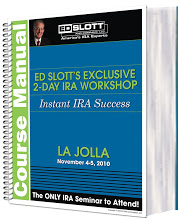1.
My husband turns 70 in September. I turn 66 in August. I don't think we will have enough cash to pay for a conversion to a Roth IRA for both of us this year. In such case, which IRA should we convert first or should we convert a portion of each?
Thank you for your help. Your books have been so informative.
Editor's Note: CLICK HERE to purchase any of Ed Slott's books.
Answer:
You have several options. You can convert one of the two IRAs to a Roth IRA in 2010 or you can convert a portion of each. Assuming both IRAs are not of equal size perhaps you have enough liquidity to pay the income tax on one conversion. Keep in mind that for 2010 conversions you have the option of adding the conversion (assuming all pre-tax dollars) amount to your 2010 income tax return or spread it equally over tax years 2011 and 2012. If you decide to convert both IRAs in 2010 you can elect one method and your husband can elect the other method. One other factor is your husband's age. He will have to start taking required minimum distributions next year and the required distribution must be taken before any of the IRA can be converted. If you are not counting on his required distributions to pay your living expenses, you should consider converting as much of his IRA as you can afford to a Roth this year. That will reduce or eliminate his required distributions in the future.
2.
I just received a sizable gift check from my mother who is trying to give her 3 kids money now to avoid probate taxes for us later. She's 85 and sharp as a tack!
Can I just take this check or any future "extra" money and go open a Roth IRA account at any bank? How and when am I taxed on this new gift money? Should I just deposit it into my checking account and wait for a good rate opportunity for a Roth IRA CD?
I'm still working at age 64, make under $100,000/annually and don't plan on retiring until I'm ready for the grave. I can only afford to have 3% taken out of my pay for the IRA program here at work (we get 3% matching funds).
Am I pretty free to open Roth accounts whenever I have the extra money--up to some limit, I'm sure?
I just bought your book after watching your PBS show, but have not read very far yet. I like what you have to say. Thanks!
Answer:
Your mother can gift up to $13,000 per year to each child and not incur a gift tax. In addition it is not taxable to you when you receive it. You might be able to use some of the money to open a Roth IRA. The first requirement is that you have "earned" income which is generally W-2 income or self-employment income. Then it will depend on whether you are filing a single or joint tax return.
For example: If you are single the phase out ranges for 2010 are $105,000-$120,000. After $120,000 you cannot contribute to a Roth IRA. If you are filing a joint return the phase out ranges for 2010 are $167,000-$177,000. Assuming you can contribute, the maximum amount you can contribute in 2010 is $5,000 plus an extra $1,000 if you are age 50 or older this year. If you do not qualify to contribute to a Roth IRA, you can contribute to a non-deductible traditional IRA. With the extra money you might also want to consider increasing your contribution to your company plan.
3.
I follow the website and also am a subscriber to the monthly newsletter and find them both very useful. My question is if I am in a high income bracket and make a non deductible Traditional IRA contribution in 2010, can I roll that amount over in 2010 to a Roth. I cannot contribute directly to a Roth, the reason for the extra step.
Thanks,
Matt
Answer:
Thank you for subscribing to our newsletter and viewing our website. Yes you can make a non-deductible traditional IRA contribution and then immediately convert to a Roth IRA. This is one of the few loopholes in the tax code. Your conversion will be subject to the pro-rata rule. If you have any IRAs that hold pre-tax funds, you will pay some income tax on your conversion. If you have no other IRAs, because you are making a non-deductible contribution to the traditional IRA you will have basis and your tax liability on the conversion will be zero or very little.
By IRA Technical Consultant Marvin Rotenberg and Jared Trexler
------------------------------------------------------------------------------
Comment, Question, Discussion Topic on your mind? Click on the Blue Comment Link below and leave your thoughts then check back to see what other consumers and advisors think.
*Copyright 2010 Ed Slott and Company, LLC
















1 comments:
I don't believe the answer to #2 is correct with respect to income limits for Roth IRAs. From the IRS website:
"Can You Contribute to a Roth IRA?
Generally, you can contribute to a Roth IRA if you have taxable compensation (defined later) and your modified AGI (defined later) is less than:
$176,000 for married filing jointly or qualifying widow(er),
$120,000 for single, head of household, or married filing separately and you did not live with your spouse at any time during the year, and
$10,000 for married filing separately and you lived with your spouse at any time during the year."
Post a Comment